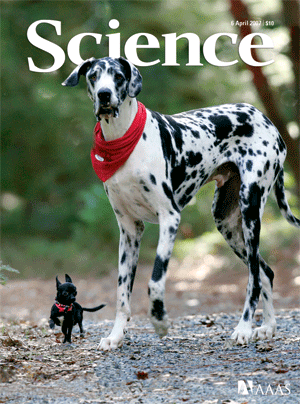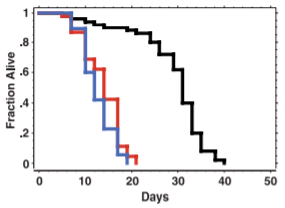Genetics of Anti-Aging
TL;DR It seems there are genetic regulatory pathways for aging. Some individuals have expressed mutations that favor maintenance and longevity. In normal individuals environmental stress particularly caloric restriction seems to inhibit those pathways leading to more longevity.
One of the great notable differences about animals of the same size is their lifespan. A mouse is similar in size and shape to a bat but the bat's lifespan is 25x that of the mouse. On the other hand, how does an animal as big as a whale reach 200 years? The reason for this seems to be that they have different genes.
If you take an animal with a relatively short lifespan whose DNA is well known by researchers then if in the same species there are longevity differences those must have alterations. This seems easier than comparing one animal to another. The logic of this is that if there are points of regulation in genes for aging, then producing an animal that could live longer is possible.
This was tested in a worm called C. elegans. Their lifespan is close to two weeks after hatching. It didn't take long before a mutant variation that already lived to 30-50% longer than a normal worm was found.
A mutation identified like DAF-2 doubled the lifespan of the worms that had it.1 As shown by the graphic, by day 30 in the wild type are all dead but the in the mutant above 80% are still alive and thriving at the same time.
To put it into perspective. A single mutation made the worm equivalent of a 90-year-old human behave like one in its late 20's.
The DAF-2 gene encodes a hormone receptor, is a membrane receptor and its stimulation speeds up aging. This receptor is similar to two hormone receptors in humans: The receptors for insulin and IGF-1 2 these receptors signal the uptake of energy and growth.
This actually correlates well to other animals. In the case of Drosophila melanogaster3 a mutation in the gene that encodes the insulin/IGF-1 receptor results in higher longevity, which can be taken as a hint that the normally functional receptor acts as an inhibitor of longevity.
In the case of mice, the receptors are separate. If a mouse is heterozygous for the mutation of the IGF-1 receptor it still lives 20% longer. If you remove the functionality of the insulin receptor from the fat tissue the mouse lives longer and even with a high-fat diet they don't get fat. 4
This means is a highly likely scenario that they share a common ancestor in which this was the mechanism for controlling aging. This path can be traced further.
In the case of dogs, it has been shown that a big dog like a great Dane can live 5-7 years, while a small dog like a chihuahua can live up to 20 years (a difference of 50 times in mass for the same species). The single determinant factor for size is a single allele difference in IGF-1.5

The effect of the homologous genes to DAF-2 have different periods of activity. In the case of Drosophila and C. elegans, there was no alteration to size to extend lifespan and since growth in most animals is not required to continue beyond a certain period. In the case of C. elegans the turn down of the DAF-2 gene by RNAi at different stages of its life and found that most of the benefit comes from turning the gene down after adulthood.6
Another factor identified was the presence of DAF-16 that acts as a transcription factor. In DAF-2 mutants that also lack DAF-16 the extension of lifespan is no longer functional.7

DAF-16 encodes a transcription factor that is at the end of a kinase cascade, and when phosphorylated, DAF-16 accumulates in the nucleus and seems to be the center of a cumulative cascade of regulation in other nuclear genes.
In the case of mutants with alterations for the path of IGF-1, like GH mutations, there are no significant benefits to caloric restriction as the route is already down-regulated. In mice without the alteration the caloric restriction makes them behave like the mutant.8
These genes seem to be an evolutionary adaptation to changing environmental conditions and means to protect the population enough to reproduce and to age shortly after resources have normalized and reproduction has been fulfilled.
As a side note: In another post, I examined briefly a type of caloric restriction diet known as intermitent fasting. There I mentioned how caloric restriction diets are the only reliable known way, applied statistically to populations to extend life. In the case of humans the official position is that concensus is that the long term effects are unknown9 , the benefits of this are controversial in their universality in most animals since there exist variation in response for individuals that have a genetic makeup that has alterations in this pathway.
References

Images referenced, sourced or modified from google images, labeled for reuse
My previous post ↶ @ertwro


How long for gene therapy? Hopefully soon :)))
Very soon. CRISPR is a hot thing right now in the biotech community at large. I need more fingers to count the number of people I know working on tools in this space. The biggest problem remains delivery into cells throughout the body.
Indeed, I'm waiting for gene therapy for my eyes...I use to have 20/20 vision. I think most of us constantly in front of screens is messing up our eyesight...I was looking into getting an e ink android reader for a display instead of using my phone. I started using blue light filter on my phone but still not good enough
Myopia or short sightedness, has become a growing problem over the past few decades. The cause is, spending too much time at a close focal length. It causes stress on the focusing muscles. The muscles eventually go into a spasm. When you then try focus far out, the muscles temporarily cannot re-focus.
This ‘blurred vision’ compels us to go to the optometrist. Instead of the good doc telling us to rest the eyes and spend some time focusing at lengthier focus lengths, they slap you with a 3oo dollar pair of spectacles.
The eye never recovers, but actually has to change its shape to accommodate the lense. A year later, your eyes have deteriorated and you repeat the process.
Here is a video of an eye specialist who exposes the truth behind short sightedness.
Thanks so much for sharing this video. I watched the whole thing and I will be trying his methods. I think this is going to work out for me. I Always thought that if you read far trying to force your eyes to do it that would be bad for your eyesight. Actually forcing your eyes to read from far away will improve my sight. This is great to know.
It is a pleasure. Be patient with the process. It can take years to fully reverse myopia, if you have been wearing prescription eyewear for a long time.
Keep in touch with how things go.... I would love to hear how you progress .
i sure will, thanks again for the info.
Advances are being made quickly especially in the field of hematology and for long action therapy in diabetic retinopathy. Pre-clinical trials are promising.
How amazing that we have a lot of smarts people with amazing technology.
Here are some of my favorite fun facts in this area :
Caloric restriction has been known for decades to cause lifespan increase in lower organisms, but we've never really known why. This pathway however shed lots of light when it was elucidated. Since DAF-2 is homologous with the insulin/IGF receptor, it provides a mechanistic link between nutrient status and recycling/repair pathways in the cell that are thought to cleanup intracellular junk.
But even more evidence has come forward! Some stunning work by the Panda lab has demonstrated that intermittent fasting can also boost lifespan, and this benefit can be completely separated from calorie count! His lab has shown that restricting mealtimes itself is sufficient to promote longevity even if the calorie intake is the same as with control animals. The time restricted mice are also lean, which sheds some interesting perspectives on obesity research :)
The last interesting evidence has come forward with methionine restriction studies. In these experiments, mice are fed a diet in which the amino acid methionine is restricted, but all else is equal. These mice benefit from dramatic improvements in longevity and are also incredibly lean towards the end of their life. Whats going on?
Methionine is the amino acid that starts every single protein, so without it, the body cannot synthesize new proteins unless it is scavenged from other existing proteins. This potentially turns up the same recycling pathways that were elucidated in the DAF-2/DAF-16 pathway! But this remains to be determined.
In short, we always thought that calories were all that mattered in metabolic syndrome and aging, but maybe the true answers are much more specific!
There are some interesting possibilities like the increase of expression in Apo-B proteins for lipids mobilization due to accute environmental stress like intermittent fasting. Is an area where big and quality studies are lacking. I'm particularly interested in mitochondrial responses to stress. The fog is starting to disappear but we'll see. Thanks for stopping by.
Great thoughts on Apolipoproteins. I so want to learn much more about them. They seem to be key links to everything don't they?
Interesting. Is the research into all this being funded adequately? I'm looking into ways to get more private funding to life-extension research.
No it most definitely isn't! I certainly don't work in a lab anymore. $30k is not enough to live on ;)
Check out lifespan.io
I agree there is most definitely a piece we've yet to discover. I am most interested in seeing the link between caloric restriction and senesence. As far as I understand, there's a link between death caused by 'natural causes' and senesence.
I think you are right. Companies like Unity Biotechnology are also making this bet with tons of backing as well.
Good to know. I look forward to any additional info you might have on this subject. Thank you for the info.
thanks for this post
teally interesting article. The human race seems to be in the verge of a major breakthrough that could significantly increase life expectancy. That would be great for individuals but put a massive strain on the planet! Difficult decisions!
I thought its a time machine going to other side of the world. Lol
We just heard of one lady in the UK who is 110 this week! Originally her family was from Jamaica, she is still very much compus mentis and had the reporter on BBC sing Happy Birthday to her. She also had her second birthday card from HM Queen Elizabeth 11, as she had one whe she reached one hundred, something that everyone who reaches that age gets from the Queen. Not many people can top that record!
Is a really happy event. Statistically speaking most of us will never be so fortunate. one can but hope she had a good life and continues having a good life.
With this one, you get really notional. In spite of that, thanks!
I am still puzzled about how to conclude anything for humans. Of course, one may have correlations. But a correlation is after all, a correlation ;)
No, I don't conclude for humans. This was mainly about the case for C. elegans and mammalians like mice. In the 8th footnote, there's an article where you can see in depth the associations derived from this to humans but is not the main point of what I wrote.
A more in-depth review is the case for humans is the correlation between lipoproteins and extreme longevity that is also regulated by (IGF-1 - insulin)/FOXO https://dx.doi.org/10.1007%2Fs11357-006-9020-x
I did mention a previous post I made on intermittent fasting, but not even in that post I conclude anything about humans, even linked to it.
If you think my writing is not clear or have suggestions in how to improve it, please do so.
Sorry, I misread you. I understood "how you conclude anything for humans".
Well, the first thing is that in biology most of the time we only have correlations and causality is less clear than say for instance in physics. An important thing is that the biggest studies on longevity and the consensus of doctors and biologists are that a hypocaloric diet has longevity benefits. Most of consistent with animal models, but is the current approximation to the subject that most of us agree on.
If you have any recommendation to improve my writing I would appreciate it dearly. Especially since today I had so many troubles with a glitch in a macro I made for the HTML and had to correct so many times. Thanks, again.
Hehe. Yeah I indeed know you did not conclude for humans but what more asking whether there would be any chance to extrapolate. Anyways, thanks for both answers. They help a little bit (biology is very very very very far from what I know :p )
Thank you, ertwro. What is your position regarding epigenetics?
Made a post about it. https://steemit.com/science/@ertwro/epigenetics-not-quite-transgenerational-yet
Kurzgesagt – In a Nutshell have just put out a video about this